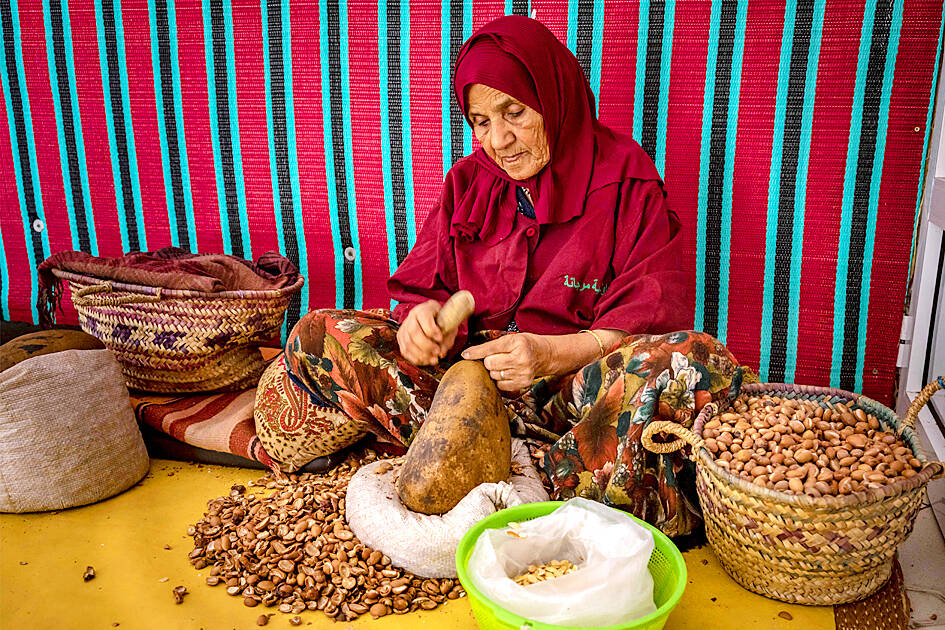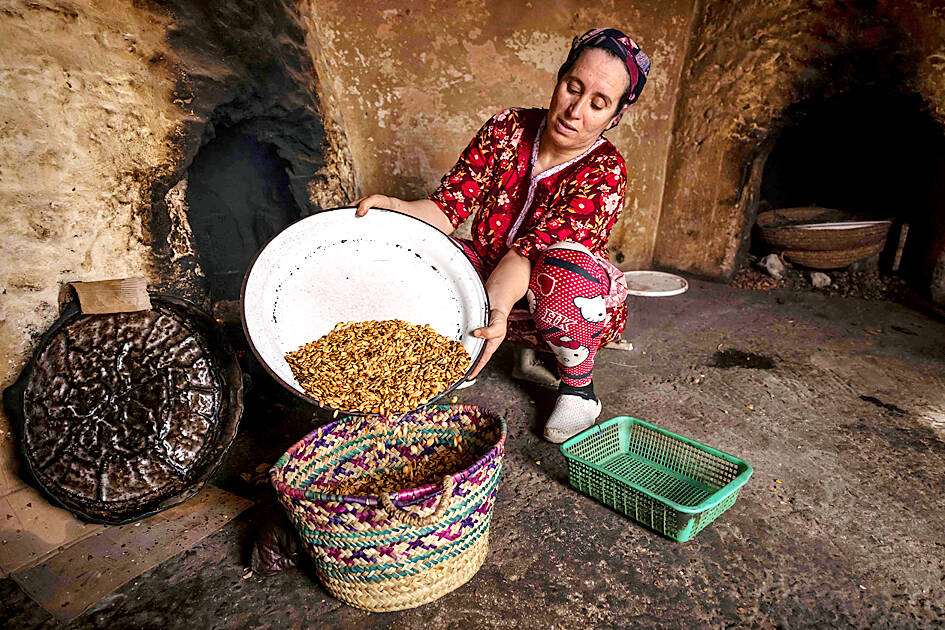Morocco’s argan oil is highly prized by the cosmetics industry, yet it is now mostly produced by elderly workers, raising questions about how long the artisanal practice can continue.
A dozen women, sitting on the floor of a workshop inland from Essaouira, a port town on Morocco’s Atlantic coast, work to deftly shell argan nuts, crush them and extract the oil.
It is a time-honored and labor-intensive craft, but one increasingly shunned by young people in the North African kingdom.

Photo: AFP
The women, mostly older than 60, manually pulp the small yellow fruits at Cooperative Marjana, while others use hammers to crush the robust shells and remove the nuts.
The fruits are then sorted, roasted, ground and pressed for their oil, which is used in cooking, but has also long been famed for its moisturizing and anti-ageing properties for skin and hair.
“It’s difficult work and it requires experience and, most of all, patience,” said Samira Chari, who at 42 is Marjana’s youngest artisanal worker.

Photo: AFP
Cooperative founder Amel El Hantatti said the job’s physical nature is one reason “young people aren’t taking up this craft anymore,” despite a lack of local employment.
The area’s otherwise arid landscape is home to vast argan orchards.
Tourists stopping to see the production process and buy argan products are warmly welcomed by Marjana’s all-female staff.
Argan is so important to the region between the towns of Essaouira and Agadir that in 1998 UNESCO declared a biosphere reserve in the area and later added the tree’s cultivation to its intangible cultural heritage list.
Argan oil is the main source of revenue in this part of southern Morocco, where few other crops survive the low rainfall and searing summer heat.
It is also widely used in Moroccan cuisine and has been certified with an Appellation of Origin since 2010.
Hantatti founded the cooperative in 2005 and said it now employs 80 women, some working in production and others in sales.
However, “I really fear that the artisanal production of argan oil might disappear,” she said.
The cooperative’s younger workers prefer to work in the gift shop, selling argan soap, shampoo and moisturizer.
“I tried to work a few days with the craftswomen, but I couldn’t carry on, it’s a hard process and really tiring,” Assia Chaker, 25. “I like having contact with people and practicing other languages with tourists who come into the shop every day, instead of spending the whole day crushing and pulping argan nuts.”
“Anyway, one day the job will be done by machines,” she added.
Hantatti said the process is difficult to mechanize, adding that “oil extracted by machines will never have the same flavor as what the women produce.”
“It contains all the positive vibes of these artisans, their laughter, the stories they share as they’re working. There’s a spiritual quality that makes it special and unique,” she said.
The cooperative produces up to 1,000 liters of oil per year and works with tour companies bringing groups of visitors as they pass through the popular coastal region.
Morocco produces about 5,640 tonnes of argan oil annually, about 40 percent of it for export, official data showed.
The sector’s turnover tripled between 2012 and 2019 to reach about US$115 million, data from the Moroccan Ministry of Agriculture, Fisheries, Rural Development, Water and Forests showed.
Producers in Essaouira say the next generation has little interest in learning their craft.
“All I’ve known all my life is argan oil,” said Samira as she roasted nuts in a large clay oven. “For me, it’s as essential as oxygen and water.”
The divorcee did not have the opportunity of an education and works 10 hours a day to provide for her children.
Samira learned every stage of argan oil production from her parents, skills traditionally passed from generation to generation.
She said that her children have no desire to go into the industry — a choice she understands.
Yet, with a growing body of scientific research backing up its health claims, argan oil remains an important part of the local economy and a sought-after commodity worldwide.
Morocco’s government has also been paying more attention to the sector, notably by building 13 reservoirs to collect scant rainfall and help mitigate the region’s ever-worsening droughts.
Rabat aims to double argan oil production by 2030, hoping to support the emergence of a “new generation of the rural middle class.”
With fewer young people taking up the craft, it is unclear whether another generation would learn the traditions associated with the tree.

Four people jailed in the landmark Hong Kong national security trial of "47 democrats" accused of conspiracy to commit subversion were freed today after more than four years behind bars, the second group to be released in a month. Among those freed was long-time political and LGBTQ activist Jimmy Sham (岑子杰), who also led one of Hong Kong’s largest pro-democracy groups, the Civil Human Rights Front, which disbanded in 2021. "Let me spend some time with my family," Sham said after arriving at his home in the Kowloon district of Jordan. "I don’t know how to plan ahead because, to me, it feels

The collapse of the Swiss Birch glacier serves as a chilling warning of the escalating dangers faced by communities worldwide living under the shadow of fragile ice, particularly in Asia, experts said. Footage of the collapse on Wednesday showed a huge cloud of ice and rubble hurtling down the mountainside into the hamlet of Blatten. Swiss Development Cooperation disaster risk reduction adviser Ali Neumann said that while the role of climate change in the case of Blatten “still needs to be investigated,” the wider impacts were clear on the cryosphere — the part of the world covered by frozen water. “Climate change and

Poland is set to hold a presidential runoff election today between two candidates offering starkly different visions for the country’s future. The winner would succeed Polish President Andrzej Duda, a conservative who is finishing his second and final term. The outcome would determine whether Poland embraces a nationalist populist trajectory or pivots more fully toward liberal, pro-European policies. An exit poll by Ipsos would be released when polls close today at 9pm local time, with a margin of error of plus or minus 2 percentage points. Final results are expected tomorrow. Whoever wins can be expected to either help or hinder the

DENIAL: Musk said that the ‘New York Times was lying their ass off,’ after it reported he used so much drugs that he developed bladder problems Elon Musk on Saturday denied a report that he used ketamine and other drugs extensively last year on the US presidential campaign trail. The New York Times on Friday reported that the billionaire adviser to US President Donald Trump used so much ketamine, a powerful anesthetic, that he developed bladder problems. The newspaper said the world’s richest person also took ecstasy and mushrooms, and traveled with a pill box last year, adding that it was not known whether Musk also took drugs while heading the so-called US Department of Government Efficiency (DOGE) after Trump took power in January. In a